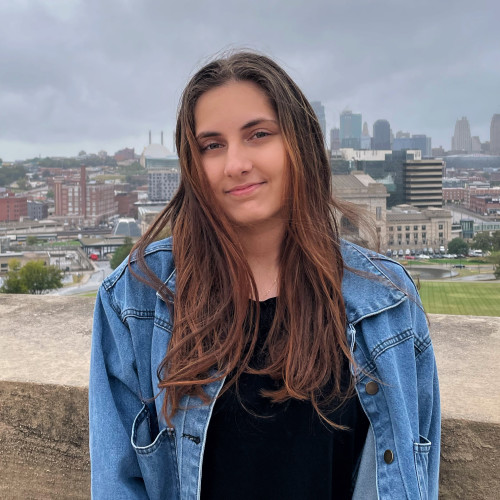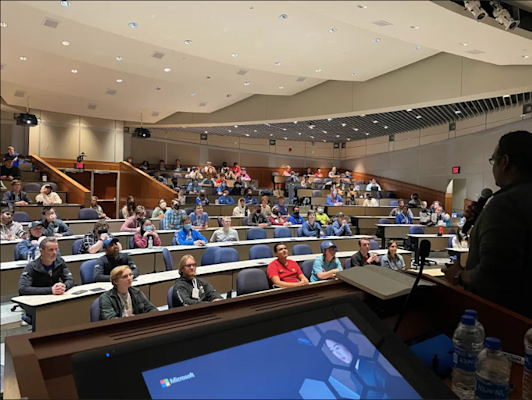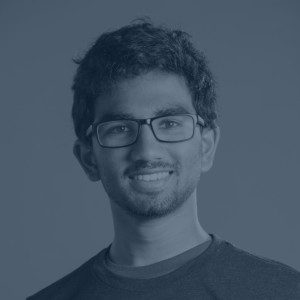Firangiz Ganbarli, 19

Firangiz Ganbarli first became interested in pursuing a career in technology in high school. She says her interest all began when she took a required ICT (information communication technology) course she excelled in. “For one section of this class, we had an introduction to Java and I was fascinated by the programming and coding side of Computer Science,” Firangiz says. Pairing her fascination of coding with her childhood love of mathematics, she says it made perfect sense to apply for computer science programs for college. Almost immediately, she learned about hackathons and the incredible experiences they provide, especially for hackers just starting off.
Unfortunately, at the time she was launching her career in technology, it was exceedingly difficult for Firangiz to participate in hackathons. Growing up in Baku, the capital of Azerbaijan, Firangiz didn’t have regular opportunities to attend hackathons. Until the onset of the COVID-19 pandemic, opportunities to attend hackathons were few and far between. It was only after many of these events transitioned to a virtual format that she was able “to attend hackathons, workshops, and tech talks.”
These new opportunities were crucial for Firangiz, who says the transition to virtual formats with the onset of the pandemic “opened many doors for me, one of them being able to come and study in the United States, where I had more physical access to the hacker community.” She earned a full-ride scholarship to the University of Kansas and was able to attend her first hackathon, Neural Hacks, the summer after she graduated high school. The event focused on AI for social good, so Firangiz built an augmented reality app for iOS, iPhones for Seniors, which helps the elderly navigate the often-complicated world of smartphones. While she won the hackathon for her work on the app, she felt a strong desire to collaborate with other hackers from around the world, so when she discovered MLH, she knew she had found her community.
Participating in several MLH member events, including Hack the 6ix, VandyHacks, and ShellHacks, Firangiz found that hackathons were her “ideal place to play around and learn new technologies and frameworks.” Having had such positive experiences at hackathons herself, Firangiz wanted to find ways to give back to the hacker community by helping to organize hackathons for other young hackers. First, joining the club that organized HackKU and working as an Events and Logistics organizer in 2021, she was named the Head Organizer for HackKU 2022. Through the experience, she was able to work with other hackers, network with sponsoring companies, and even earn herself a competitive internship with Microsoft.
To Firangiz, “there is a great responsibility for an organizer to make sure hackers [both] enjoy and get something out of their hackathon experience.” Hearing from attendees that their HackKU experience had been important in job interviews and had made a difference to other hackers made a lasting impact on Firangiz. She has stayed involved in the hacker community and is now the president of the University of Kansas’ chapter of the Association for Computing Machinery (ACM) as well as an organizer for Women in Computing, KU events in the Lawrence, Kansas area. She hopes to help empower the next generation of women in technology by teaching Python.
Quick Facts

Firangiz Ganbarli, 19

Firangiz Ganbarli first became interested in pursuing a career in technology in high school. She says her interest all began when she took a required ICT (information communication technology) course she excelled in. “For one section of this class, we had an introduction to Java and I was fascinated by the programming and coding side of Computer Science,” Firangiz says. Pairing her fascination of coding with her childhood love of mathematics, she says it made perfect sense to apply for computer science programs for college. Almost immediately, she learned about hackathons and the incredible experiences they provide, especially for hackers just starting off.
Unfortunately, at the time she was launching her career in technology, it was exceedingly difficult for Firangiz to participate in hackathons. Growing up in Baku, the capital of Azerbaijan, Firangiz didn’t have regular opportunities to attend hackathons. Until the onset of the COVID-19 pandemic, opportunities to attend hackathons were few and far between. It was only after many of these events transitioned to a virtual format that she was able “to attend hackathons, workshops, and tech talks.”
These new opportunities were crucial for Firangiz, who says the transition to virtual formats with the onset of the pandemic “opened many doors for me, one of them being able to come and study in the United States, where I had more physical access to the hacker community.” She earned a full-ride scholarship to the University of Kansas and was able to attend her first hackathon, Neural Hacks, the summer after she graduated high school. The event focused on AI for social good, so Firangiz built an augmented reality app for iOS, iPhones for Seniors, which helps the elderly navigate the often-complicated world of smartphones. While she won the hackathon for her work on the app, she felt a strong desire to collaborate with other hackers from around the world, so when she discovered MLH, she knew she had found her community.
Participating in several MLH member events, including Hack the 6ix, VandyHacks, and ShellHacks, Firangiz found that hackathons were her “ideal place to play around and learn new technologies and frameworks.” Having had such positive experiences at hackathons herself, Firangiz wanted to find ways to give back to the hacker community by helping to organize hackathons for other young hackers. First, joining the club that organized HackKU and working as an Events and Logistics organizer in 2021, she was named the Head Organizer for HackKU 2022. Through the experience, she was able to work with other hackers, network with sponsoring companies, and even earn herself a competitive internship with Microsoft.
To Firangiz, “there is a great responsibility for an organizer to make sure hackers [both] enjoy and get something out of their hackathon experience.” Hearing from attendees that their HackKU experience had been important in job interviews and had made a difference to other hackers made a lasting impact on Firangiz. She has stayed involved in the hacker community and is now the president of the University of Kansas’ chapter of the Association for Computing Machinery (ACM) as well as an organizer for Women in Computing, KU events in the Lawrence, Kansas area. She hopes to help empower the next generation of women in technology by teaching Python.
Quick Facts




